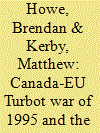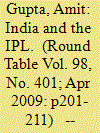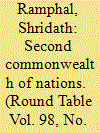| Srl | Item |
| 1 |
ID:
088065


|
|
|
|
|
| Publication |
2009.
|
| Summary/Abstract |
Many scholarly analyses of small economies over the past two decades have been premised on the implicit understanding that a state's small population size, compounded by such factors as islandness and remoteness from markets, is to blame for an inherent and unavoidable economic vulnerability. The article critiques the core features of this approach, and proposes in turn to discuss and profile the development trajectories of small economies from the vantage point of the strategic flexibility used by small states (at multiple levels as individuals, household units, corporate entities and complete jurisdictions) in seeking to exploit opportunities and maximize economic gains in a turbulent and dynamic external environment with which they must engage. Keeping alive a portfolio of skills and revenue streams enables these actors to migrate inter-sectorally as well as trans-nationally.
|
|
|
|
|
|
|
|
|
|
|
|
|
|
|
|
| 2 |
ID:
088066


|
|
|
|
|
| Publication |
2009.
|
| Summary/Abstract |
This paper examines how and why in March 1995 certain elements of the Canadian government decided to take unilateral forceful action against foreign fishing off the Grand Banks and go against a long tradition of cooperation and multilateralism. In particular, it will address to what extent existing models of decision-making (in particular rational and bureaucratic models) adequately explain the process that went on in Ottawa at this time. The findings are that even though the bureaucratic politics model of decision-making can be used in a parliamentary structure like Canada, it is insufficient to explain Canadian decision-making processes during the Turbot War, and thus must be supplemented by a more inclusive cybernetic approach.
|
|
|
|
|
|
|
|
|
|
|
|
|
|
|
|
| 3 |
ID:
088069


|
|
|
|
|
| Publication |
2009.
|
| Summary/Abstract |
This article examines why India has emerged as the preeminent nation in international cricket and how the Indian Premier League (IPL) is a major step in realigning the power structure in international sports. The article argues that India has been able to take the lessons of globalization (as they apply to sport) and use them to create a new national cricket league that has an international character. It goes on to argue that the success of the IPL and similar sporting ventures in nonwestern nations is likely to see these countries challenging the West's sporting monopoly and getting to increasingly determine where and how the game is played.
|
|
|
|
|
|
|
|
|
|
|
|
|
|
|
|
| 4 |
ID:
088067


|
|
|
|
|
| Publication |
2009.
|
| Summary/Abstract |
Authoritarianism and a dominant state have characterized the response of the state towards opposition discourses in Malaysia and Pakistan. Both countries are interlinked on various levels and experience growing private sector activities which bring both regions even closer together. Between these two poles grassroots and opposition networks have emerged that often define themselves through Islam. While political dissidence has little chance of being heard, weakened institutional frameworks of the state have given way to transnational networks. Not so much a reflection of supra-national al-Qaeda activities, they are rather a result of political and social dissatisfaction which is home-grown. Meanwhile there are signs that civil society and the prospering private sector could provide niches in which new 'alliances' between the two regions emerge that to a certain degree function independently of the state. By strengthening the growing middle classes, this could release some of the pressure of discontent that increases dramatically in both countries.
|
|
|
|
|
|
|
|
|
|
|
|
|
|
|
|
| 5 |
ID:
088070


|
|
|